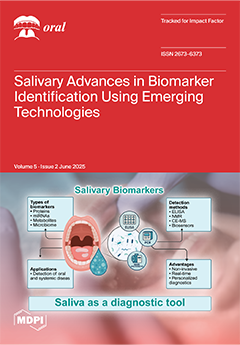Background: The rapidly growing elderly population in Sri Lanka faces multiple challenges, including the ill effects of tooth loss. Tooth loss and denture wear could both affect the amount and variety of food intake of the elders, leading to a state of compromised health. Therefore, it is essential to identify whether both tooth loss and denture wear affect the nutritional status of the elderly. This study evaluated the associations between tooth loss, denture-wearing status, and nutritional levels among a sample of the elderly population attending the Dental Teaching Hospital in Peradeniya, Sri Lanka.
Methods: An analytical cross-sectional study was carried out at the Dental Teaching Hospital in Peradeniya, Sri Lanka. Using the G*Power v3.1 statistics software, a sample size of 61 patients aged 60 years and above was determined as the minimum sample size. Data were gathered by means of a self-administered questionnaire, patients’ files, and an examination to identify height and weight for assessing body mass index (BMI). Minitab v18.0 statistical software was used for analysis of data, and a
p-value < 0.05 was considered statistically significant.
Results: One hundred patients were recruited for this study, and the majority (sixty-seven) were female. The majority (71%) were between the ages of 60 to 69 years. The majority (60%) were denture wearers and 8% had nine or more occluding pairs (of natural teeth), 25% had five to eight, and 67% had four or fewer occluding pairs. Fifty-two percent (52%) were of normal weight, while 40% were over-weight and 8% were underweight, respectively. No statistically significant associations were identified between BMI and the denture status or number of missing teeth (
p-values > 0.05). There were no statistically significant associations between the underweight or overweight status and denture wearing or occluding pairs (
p-values > 0.05). However, the frequency of grain intake and the number of occluding pairs were significantly associated with each other (
p-value = 0.024). Also, the frequency of taking snacks was associated with denture wearing (
p-value = 0.006).
Conclusions: The nutritional status (BMI) of the elderly does not necessarily correlate with their denture-wearing status or the number of existing occluding pairs/number of missing natural teeth. There is no significant association noted between the denture-wearing status and the food avoidance (soft, hard food, fruits, and grains, except snacks). There is no significant association between the number of occluding pairs available in natural dentition and the avoidance of soft foods or snacks, except for grains. Given the limitations of this study, it can be suggested that nutritional strategies for the elderly population could be designed universally, irrespective of their dentate or denture status. However, further research with a larger cohort is needed to validate these findings.
Full article





